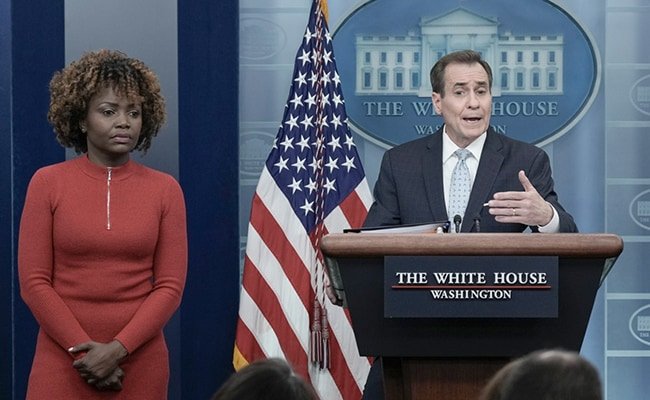

The remark by Kirby comes before President Joe Biden departs for New Delhi on Thursday.
Washington:
The United States hoped that all the countries would sign the joint declaration in this week’s G20 Summit in India but also signalled that it is difficult to get a consensus as countries like Russia and China are less likely to “sign on” it.
John Kirby, National Security Council (NSC) coordinator for strategic communications, also pointed out that the G20 summit may also end without a joint declaration as Russia and the West continue to spar over the Ukraine war among other issues.
Ahead of the highly-anticipated meeting in the Indian capital G-20 Sherpas are making a last-minute attempt to reach a consensus over the proposed “Delhi Declaration” to be adopted at the summit.
Responding to a query by ANI regarding the US’ optimism about the joint declaration in this G20, the top White House Official said that it is difficult to get “Twenty clocks to chime at the same time.”
The remark by Kirby comes before President Joe Biden departs for New Delhi on Thursday.
The G20 Sherpas are trying to iron out the final declaration that will be adopted by Prime Minister Narendra Modi and other leaders of G20 nations over the weekend. However, they face a tough challenge to create consensus.
“We hope so. We certainly hope so. But, I mean, I think you know it’s difficult to get 20 clocks to chime at the same time, so we’re going to have to – we’re going to work on this. We know that the Indians also would like to see a joint communique if you will, so we’ll see where it goes,” Kirby said.
The main issue is the Ukraine war with the Western countries and Russia not being able to see eye to eye on the matter.
“Often times the sticking point tends to be the war in Ukraine because countries like Russia and China are less likely to sign on to language that the rest of the international community is more uncomfortable signing on to, so we’ll see where it goes. But we’d like to see that, absolutely,” he added.
Russian foreign minister Sergey Lavrov, who will represent Moscow at the meeting, said that Russia will block any summit Declaration that doesn’t reflect Moscow’s views on Ukraine and other crises.
India insists that agreement on a final communiqué is within reach, despite geopolitical friction.
The G20 Leaders’ Summit is scheduled to take place on September 9 and 10 in India and US President Joe Biden is slated to attend the event. He will start his visit to India on September 7.
Talking to reporters during a press briefing at the Washington Foreign Press Center, Kirby said that the President is excited about the important initiatives that he will be championing at the G20.
The NSC coordinator said that Biden’s focus is going to be on delivering economic opportunity for developing countries, making progress on key priorities for the American people, from climate to technology, and showing our commitment to the G20 itself as a viable, if not vital, forum to tackle these sorts of issues.
“We’re grateful for Prime Minister Modi’s leadership during India’s presidency of the G20, and the President is certainly looking forward to his bilateral meeting with the prime minister shortly after his arrival in New Delhi. He’s also looking forward to warmly welcoming the African Union as a permanent member of the G20, the newest permanent member. And we believe that the African Union’s voice will make the G20 even stronger than it already is,” Kirby said.
Pointing out the main goals of the G20 Summit, Kirby continued, “So one of our main goals heading into the G20 is to help reshape and scale up multilateral development banks like the IMF, like the World Bank. We know that these institutions are some of the most effective tools for mobilizing transparent and high-quality investment in developing countries. And that’s why the United States has championed the major effort that is currently underway to evolve these institutions so that they’re up for the challenges of tomorrow.”
He further said that the President will also be calling on G20 members to provide meaningful debt relief so that low and middle-income countries can regain their footing after years of stress on their economies and their people.
“We’ll also be making progress on other key priorities, from climate to health, and as I said at the very top, the digital technology. In addition, we’ll spotlight the progress that we’ve been making on the Partnership for Global Infrastructure and Investment which the President calls PGII,” he added.
(Except for the headline, this story has not been edited by NDTV staff and is published from a syndicated feed.)
(This news is published through a syndicated feed courtesy NDTV)



